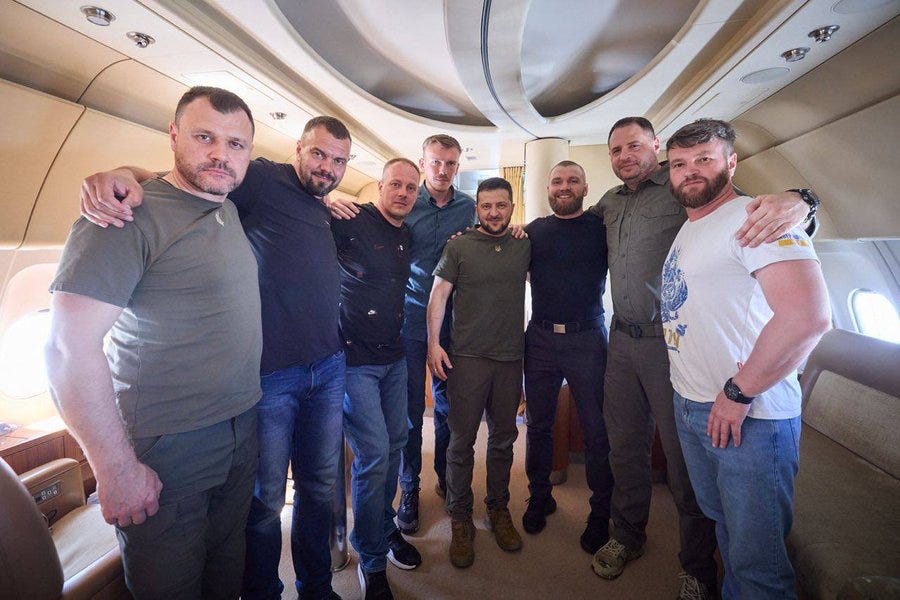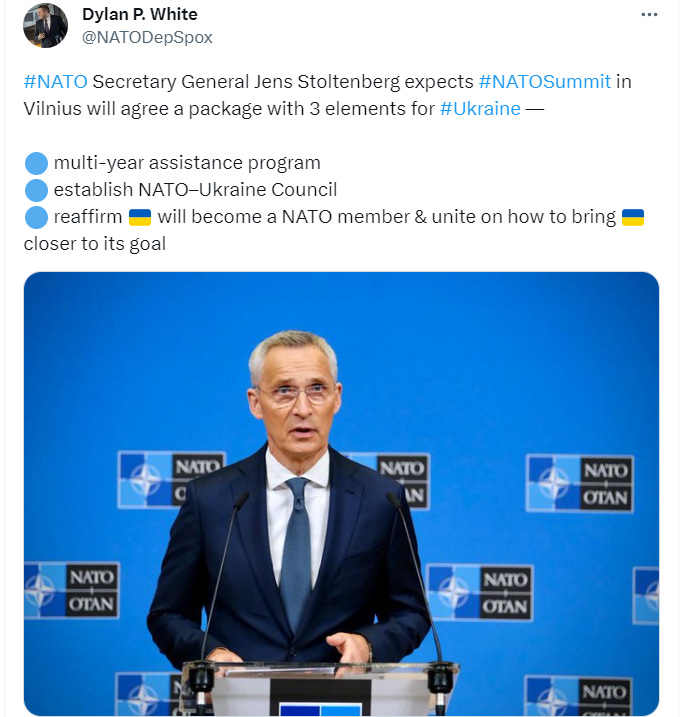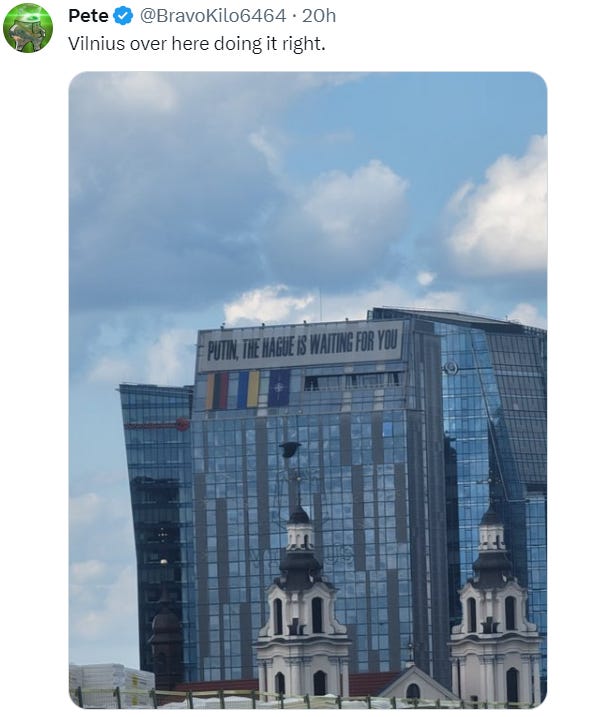Jul 9: Sunday Stories
Day 500: Lyman Sumy Kharkiv UAenergy Bakhmut Belgorod ZNPP Iran Erdogan taxis grain Netherlands Portugal Azov A&P PutinTrain A&P Insider Gic Rosenberg Fattorini Panyi Biden Zakaria
Catching up…
EA Worldview’s Ukraine Up-date- hop over to Scott’s amazing hourly Ukraine up-date page. I’ll fill in with some bits and bobs.
Zelensky: 500 days of the full-scale war. Snake Island. The free island of free Ukraine. I am grateful to everyone who fought here against the occupiers. We commemorated the heroes who gave their lives in this battle – one of the most important during the full-scale war. Glory to everyone who fights for security in our Black Sea! Honor!
Stories we’re following…
At least 8 people have been killed and another five injured in Lyman in Ukraine‘s eastern Donetsk region on Saturday, Pavlo Kyrylenko, the regional governor, said. In a Telegram message he said the city was struck by rockets at 10am and that a house and shop were also damaged. The city of Lyman is a key railway junction in the eastern Donetsk region.
Russia shells 10 communities in Sumy Oblast. Russian forces shelled 10 communities in Sumy Oblast on July 7, firing over 111 rounds from various types of weapons, the Sumy Oblast Military Administration reported on Telegram. Russians also fired missiles at Kryvyi Rih and Kharkiv.
Half of Ukraine's energy sector has been damaged by Russian attacks during the 500 days of the full-scale war with Russia. So far, 271 hits to energy facilities have been confirmed, Ukrainian Energy Minister Herman Halushchenko, on air during the national 24/7 newscast. "Unfortunately, there are facilities that have been completely destroyed and cannot be restored," the minister said. Halushchenko added that the most extensive repair campaign in history is already ongoing in Ukraine, and the task is to recover as much as possible before the heating season. The World Bank estimated the losses of the Ukrainian energy industry at US$11 billion, but the minister noted that this amount is not permanent, as attacks continue so the total damage already exceeds this figure.
Russia focusing main efforts on five areas, heavy fighting ongoing. Twenty combat engagements were recorded in the Kupiansk, Lyman, Bakhmut, Avdiivka and Marinka sectors of the front over the past 24 hours.
Russian governor claims city in Belgorod Oblast bombed. Belgorod Oblast Governor Vyacheslav Gladkov claimed that the Russian border city of Shebekino was bombed during the early hours of July 8.
The Russian occupying forces carry on mining Zaporizhzhia Nuclear Power Plant (ZNPP) and facilities on the plant's territory, with mines and explosives being delivered to the facility at this time, the Defence Intelligence of Ukraine (DIU) said. Ukrainian intelligence reports that mines and explosive barriers consisting of remote-controlled and unguided anti-personnel mines of the directional type have been planted in the technical rooms and turbine halls. The report specifies that the mines used are mostly Soviet-era directional ones: MON-50, MON-90, MON-100, and MON-200.
The Russian authorities are planning to take away the homes of Enerhodar residents to encourage Russians to work at the Zaporizhzhia Nuclear Power Plant (ZNPP), Defence Intelligence of Ukraine (DIU) has reported. DIU reported that Sergey Kiriyenko, the First Deputy Head of Putin's Administration, arrived at the occupied Zaporizhzhia Nuclear Power Plant on 6 July.
"After the invasion began, most of the plant's qualified personnel either left the occupied territories or refused to sign the imposed contracts with Rosatom (the Russian nuclear power company - ed.). Attempts to attract Russian employees also failed. Specialists often refuse to go to ZNPP even though they have been promised salaries and benefits.
According to the information received, a meeting was held at the plant with the participation of Kiriyenko and Yevhen Balytskyi, the governor of Zaporizhzhya Oblast, to provide additional incentives for potential employees from Russia.
For this purpose, it is planned to provide Russians with housing confiscated from Ukrainians who have left the territory of Enerhodar".
Steve Rosenberg: “At a disused army base in Belarus we’re shown rows and rows of freshly pitched tents. Alexander Lukashenko says Wagner mercenaries can move in here, if they want. No sign of them yet. And unclear when/if Wagner’s relocation to Belarus will happen. Producer Liza Shuvalova.”
Russia intends to learn from Iran's experience in the production of medical equipment. Several companies from the Urals are negotiating with Iranian business structures on the joint production of medical equipment, said Dmitry Epishin, director of the Center for Legal Regulation of Federal Relations at the Faculty of Foreign Regional Studies of the RANEPA, in an interview with Ura.Ru. According to him, Iran, which has been under sanctions for 44 years, after getting into the "black lists" of the West, allegedly made a bet on science and medicine.
Erdogan said on Saturday that Putin would visit the country in August. Speaking at a joint news conference with president Zelensky, he also urged Moscow to extend a Black Sea grain deal by at least three months. Asked on Saturday whether a visit by Putin to Turkey in August was being prepared, Kremlin spokesman Dmitry Peskov was quoted by the TASS news agency as saying: “Contacts are possible. There are no exact dates yet.”
Erdoğan also said “there is no doubt that Ukraine deserves membership of Nato”, but also reaffirmed his longstanding call for peace negotiations.
Look who’s still producing chips in Russia. Marco Fattorini tweeted: “In Russian supermarkets you can find Pringles chips «with the flavor of victory» and the flag. But didn't Kellogg's, which owns the brand, announce its withdrawal from Russia just a few months ago?”
Gazprom threatens to end Russian gas transit via Ukraine. Russia may impose sanctions against Ukraine over Ukrainian oil and gas company Naftogaz' lawsuits against Russian gas giant Gazprom, Alexei Miller, CEO of the Russian gas firm, said on July 7, as cited by Interfax.
Russian Prime Minister Mikhail Mishustin has signed a decree that will grant the FSB 24-hour remote access to the databases of taxi service providers included in the government’s registry of “organizers of information dissemination” beginning on September 1.
If Russia does not agree to extend a deal allowing the safe export of grain and fertiliser from Ukrainian ports, it is unlikely Western states will continue cooperating with U.N. officials helping Moscow with its exports, the United Nations aid chief said.
Cluster bombs- DPICMs: The US Under Secretary of Defense for Policy, Colin Kahl, has defended US plans to send cluster munitions to Ukraine. At a press conference, Kahl said that the US had received written assurances from Kyiv on responsible usage of the rounds. He said that this included promises the cluster munitions would not be used “in civilian populated urban environments.”
Politico: Dutch government falls as ministers clash over migration. The Dutch coalition government collapsed Friday evening after failing to reach a deal on how to handle the number of asylum seekers entering the Netherlands. For months, ministers have been discussing new measures to limit the flow of asylum seekers to the country. But tensions came to a head this week when two coalition parties refused to support a push by Prime Minister Mark Rutte’s conservative party to make it harder for refugee families to reunite. [continue]
Portugal states support for Ukraine's NATO membership. Portugal came out in support of Ukraine's NATO membership on July 8 in a joint statement with Kyiv following a phone conversation between President Volodymyr Zelensky and Portugal's Prime Minister Antonio Costa.
Ukrainian President Zelensky returns home from Türkiye and bringing Ukrainian soldiers home. Ukrainian soldiers Denys Prokopenko, Svyatoslav Palamar, Serhiy Volynsky, Oleh Khomenko, Denys Shleha, Azov Regiment commanders. Many of their wives appealed for information on their husbands and their release. They held their positions in the Avozstal Steelworks plant in Mariupol for months.
Although many soldiers have returned from captivity, the return of the Azov commanders is relevant because Turkish president Erdogan had made a deal with Putin to keep the commanders in Turkey for the duration of the war. It’s also interesting that it’s happening now, just before the NATO Summit in Vilnius set for 11 and 12 July.
Ariana Gic: Ukraine in NATO
NATO membership is critical for Ukrainian victory and world security, but the Alliance remains unprepared to invite Ukraine to join. Roman Sohn and I propose bold Ukrainian legal & political action to unlock alliance membership: Unilateral self-integration:
UKRAINIAN SECURITY GUARANTEES FOR NATO PARTNER-COUNTRIES
We call on President Zelensky to undertake a unilateral commitment analogous to Article 5 of the Washington Treaty to formalize Ukraine's role as the eastern pillar of Europe's defense against Russia's vicious aggressive plans for destroying Western-led international order.
Ukraine should commit that, in the event of an illegal armed attack by Russia on Ukraine’s closest partner countries, Ukraine will consider this attack an act of aggression against itself, and, upon receiving request, it will provide military assistance to the victim of the aggression.
Kyiv's strong gesture will demonstratively consolidate Ukraine's leadership role in the region. It'll make Western skeptics of Ukraine's NATO membership see that Ukraine is not only seeking a security umbrella but is ready to fight for NATO's eastern if they ever face Moscow’s aggression.
Ambitions must be backed by bold actions. After the Orange revolution in 2004, Ukraine under President Yushchenko, unilaterally removed the visa requirements for citizens of Western countries. That diplomatic move opened Ukraine to the West and helped Kyiv on it EU integration path.
Today, Ukraine’s courage to do the impossible by unilateral security guarantees to NATO countries could become the key to finally unlock NATO’s doors.
President Biden speaks with Fareed Zakaria on CNN about Ukraine’s path to NATO
Insider: Putin's $75 million armored train
A joint investigation by the Dossier Center, CNN, Süddeutsche Zeitung, Westdeutscher Rundfunk, and Norddeutscher Rundfunk has uncovered that the armored train used by Vladimir Putin will cost Russia’s government budget a minimum of 6.8 billion roubles ($75 million). The investigation studied documents from the Federal Protective Service (FSO), Russian Railways, and associated state-owned companies. Zirkon Service, which carried out the project, equipped the “chief passenger” carriage (a term the company's CEO Vladimir Lulaev uses to address Vladimir Putin) with a hammam – and even a beauty parlor. The company also has plans to build cars that contain a bar, lounge, and multimedia center.
Putin's sports and health cars include facilities such as a cosmetologist's office, a gym, and even a Turkish bath (hammam). The cosmetologist's office is equipped with essential medical apparatus for emergency life-saving treatment.



Karakulov also mentioned that there had been a persistent problem with the FSO's outdated encrypted radio communication equipment. Despite repeated requests, no efforts were made to replace it for a long time, said the former officer. According to Dossier, the available paperwork does not have any information on the protection of the rail cars Putin uses for holding meetings and resting. However, there are details covering the reinforcement of the walls, windows, doors, and vestibule windows in the compartments.
Alongside the health and sports car, there are plans to attach a “multimedia center” to the armored train. A memorandum addressed to Sergey Kobzev, the deputy general director of Russian Railways, outlines an estimated project cost of 405.5 million roubles ($4.47 million).
Zirkon is also in the process of preparing two luxury cars, one featuring four compartments and a bar, while the second will have six compartments. The combined approximate price for both cars amounts to 557.86 million roubles ($6.15 million).


The company also plans to build two dining cars with special communications, “a coupling of two service cars” for resting and holding meetings, and a lounge car for 490.9 million roubles ($5.43 million). All in all, Vladimir Putin's special train will cost Russia’s government budget at least 6.8 billion roubles ($75 million), concludes Dossier.










